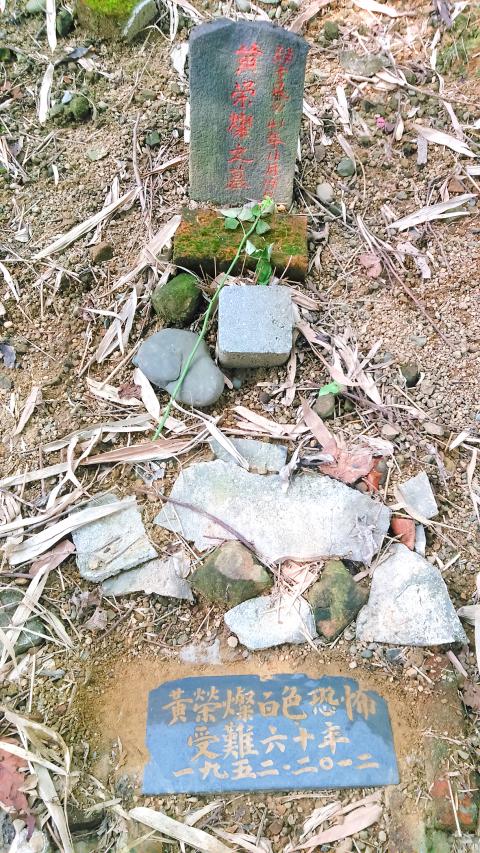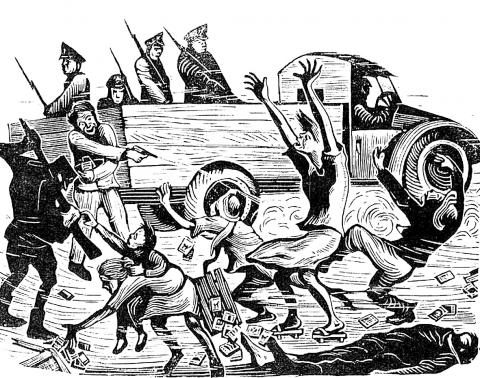The families of nearly 200 people killed in the beginning of the White Terror era have complained that a memorial park in Taipei’s Liuzhangli (六張犁) commemorating the victims of political persecution has fallen into disrepair due to government negligence, an act of neglect they branded as being disrespectful of the dead.
The Park Commemorating Victims of Political Persecution during the Martial Law Period’s (戒嚴時期政治受難者紀念公園) First Cemetery on Chongde Street in the city’s Xinyi District (信義) is covered with leaves and weeds, and strewn with cement bricks. Some of its tombstones have been toppled over, and trash and empty bottles lie strewn everywhere.
The memorial was established in 2003 to honor nearly 200 victims of political persecution between 1949 and 1953. Each tombstone is no bigger than a brick, on which the name of the victim and the date of their death are inscribed.

Photo: Chen Yen-chun, Taipei Times
One of the victims’ family members who complained about the park’s upkeep, a woman surnamed Huang (黃), said a cemetery manager has been put in charge of the facility’s maintenance, but due to its size and a lack of staff, the task of maintaining the park was next to impossible.
She expressed hope that the government would be more attentive to the issue and properly take on the responsibility for the park’s maintenance.
Taipei Mortuary Services Office Director Wu Kun-hong (吳坤宏) said the office outsourced the maintenance of the graveyard to a cleaning company at the beginning of the year, but the contract was terminated due to the company’s financial instability. The government will find a new contractor to take over the task, he added.

Photo: Chen Yen-chun, Taipei Times
Lin Chuan-kai (林傳凱), a researcher who has worked for years on the history of the White Terror era and its victims, said the public sector has taken only nominal care of the memorial park since its establishment, with most of the cleaning being done by the victims’ families and related groups.
However, the topography and relatively soft soil of the First Cemetery site make it necessary for the authorities to carry out any restoration efforts, Lin said.
He suggested that the government better publicize information about the people interred at the cemetery who lost their lives in the White Terror era and produce a visitor’s guide to the monuments to help the public better understand this period in the nation’s history.
Among the many renowned figures honored at the park is Huang Jung-tsan (黃榮燦), who created the now famous printed engraving The Horrifying Inspection (恐怖的檢查) in the aftermath of the 228 Incident.
The 228 Incident refers to the brutal military crackdown launched by the then-Chinese Nationalist Party (KMT) regime against civilian demonstrations in 1947, following an incident in Taipei on Feb. 27.
The event marked the beginning of the White Terror era, in which tens of thousands of Taiwanese were killed, went missing or were imprisoned as the government sought to stamp out dissent and forbade any discussion of the Incident.

Chinese Nationalist Party (KMT) Chairman Eric Chu (朱立倫), spokeswoman Yang Chih-yu (楊智伃) and Legislator Hsieh Lung-chieh (謝龍介) would be summoned by police for questioning for leading an illegal assembly on Thursday evening last week, Minister of the Interior Liu Shyh-fang (劉世芳) said today. The three KMT officials led an assembly outside the Taipei City Prosecutors’ Office, a restricted area where public assembly is not allowed, protesting the questioning of several KMT staff and searches of KMT headquarters and offices in a recall petition forgery case. Chu, Yang and Hsieh are all suspected of contravening the Assembly and Parade Act (集會遊行法) by holding

PRAISE: Japanese visitor Takashi Kubota said the Taiwanese temple architecture images showcased in the AI Art Gallery were the most impressive displays he saw Taiwan does not have an official pavilion at the World Expo in Osaka, Japan, because of its diplomatic predicament, but the government-backed Tech World pavilion is drawing interest with its unique recreations of works by Taiwanese artists. The pavilion features an artificial intelligence (AI)-based art gallery showcasing works of famous Taiwanese artists from the Japanese colonial period using innovative technologies. Among its main simulated displays are Eastern gouache paintings by Chen Chin (陳進), Lin Yu-shan (林玉山) and Kuo Hsueh-hu (郭雪湖), who were the three young Taiwanese painters selected for the East Asian Painting exhibition in 1927. Gouache is a water-based

Taiwan would welcome the return of Honduras as a diplomatic ally if its next president decides to make such a move, Minister of Foreign Affairs Lin Chia-lung (林佳龍) said yesterday. “Of course, we would welcome Honduras if they want to restore diplomatic ties with Taiwan after their elections,” Lin said at a meeting of the legislature’s Foreign Affairs and National Defense Committee, when asked to comment on statements made by two of the three Honduran presidential candidates during the presidential campaign in the Central American country. Taiwan is paying close attention to the region as a whole in the wake of a

OFF-TARGET: More than 30,000 participants were expected to take part in the Games next month, but only 6,550 foreign and 19,400 Taiwanese athletes have registered Taipei city councilors yesterday blasted the organizers of next month’s World Masters Games over sudden timetable and venue changes, which they said have caused thousands of participants to back out of the international sporting event, among other organizational issues. They also cited visa delays and political interference by China as reasons many foreign athletes are requesting refunds for the event, to be held from May 17 to 30. Jointly organized by the Taipei and New Taipei City governments, the games have been rocked by numerous controversies since preparations began in 2020. Taipei City Councilor Lin Yen-feng (林延鳳) said yesterday that new measures by